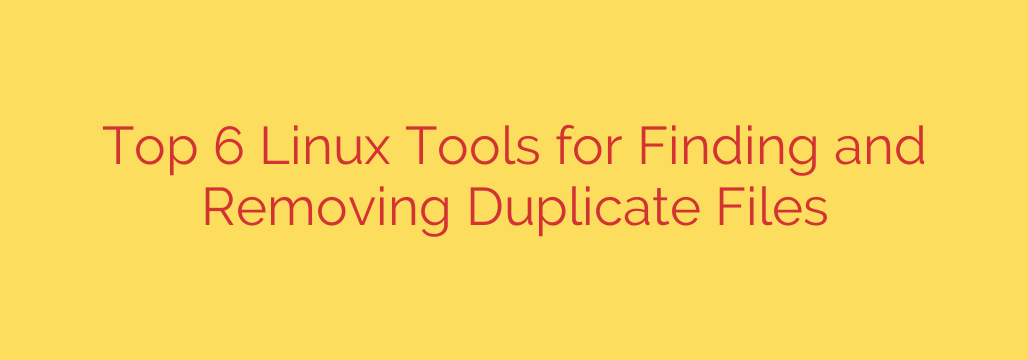
Reclaim Your Disk Space: The Best Linux Tools to Find and Delete Duplicate Files
Over time, even the most organized Linux system can accumulate a surprising number of duplicate files. These redundant copies—whether they’re downloaded documents, backed-up photos, or copied code libraries—silently consume valuable disk space, clutter your directories, and slow down your backups. Fortunately, the Linux ecosystem is packed with powerful utilities designed to hunt down and eliminate this digital clutter.
Whether you prefer the speed and scriptability of the command line or the visual safety of a graphical interface, there’s a perfect tool for the job. Here’s a breakdown of the best Linux tools for finding and removing duplicate files, helping you restore order to your file system.
1. fdupes: The Classic Command-Line Workhorse
For many system administrators and power users, fdupes is the go-to tool for finding duplicate files. It’s lightweight, fast, and available in the default repositories of most Linux distributions.
fdupes works by first comparing file sizes, then partial MD5 signatures, and finally a full byte-by-byte comparison to ensure 100% accuracy.
Key Features:
- Recursive Scanning: Easily search through entire directory trees.
- Interactive Deletion: Prompts you before deleting each file, giving you full control.
- Summarized Output: Can display a summary of the duplicate files found.
How to Use It:
To simply find duplicate files in your current directory, run:
fdupes .
For a recursive search in your Home directory, use the -r flag:
fdupes -r ~/
To find duplicates and be prompted to delete them interactively, use the -d flag. This is the safest way to delete files with fdupes:
fdupes -rd ~/Documents
2. rdfind: The Smart Duplicate Finder
rdfind (redundant data find) is another excellent command-line utility that takes a slightly different approach. After finding duplicates, rdfind uses a ranking algorithm to decide which file is the “original” and which are the duplicates. This makes it easier to preserve the file from the oldest or most root-level directory.
Key Features:
- Intelligent Ranking: Automatically determines which file to keep based on its location and timestamp.
- Hardlink Creation: Instead of deleting, you can replace duplicates with hardlinks, saving space without losing access to the file from its original location.
- Checksum Support: Uses either MD5 or SHA-1 for file comparison.
How to Use It:
To run a dry run and see what rdfind would do without making any changes:
rdfind -dryrun true ~/Pictures
To find duplicates and replace them with hardlinks (a safe, space-saving option):
rdfind -makehardlinks true ~/Pictures
3. jdupes: The High-Performance Successor
jdupes is a more modern and heavily optimized version of fdupes. Written with performance as a top priority, it is significantly faster, especially when scanning large volumes of data or directories with millions of files. It includes all the features of fdupes and adds several powerful enhancements.
Key Features:
- Exceptional Speed: Uses advanced techniques for faster scanning and processing.
- Directory-Level Logic: Includes options to consider directory hierarchies when matching.
- JSON Output: Can output results in a machine-readable format for scripting.
How to Use It:
The syntax is very similar to fdupes. For a fast, recursive search with an interactive delete prompt:
jdupes -rd /path/to/search
To find duplicates and print a summary:
jdupes -rS /path/to/search
4. dupeGuru: The Feature-Rich GUI Solution
If you’re not comfortable with the command line, dupeGuru is one of the best graphical tools available. It’s a cross-platform application that provides a clean, user-friendly interface for finding and managing duplicate files.
dupeGuru is particularly powerful because it can do more than just a standard byte-by-byte check. It has special modes for music and pictures, allowing it to find similar files even if they aren’t exact copies.
Key Features:
- Multiple Scan Modes: Can find duplicates by content, filename, or metadata.
- Fuzzy Matching for Pictures: Can find images that are similar but not identical (e.g., resized or edited copies).
- Music Mode: Compares audio files based on tags and audio data.
- Safe Deletion: A robust review window lets you carefully select which files to delete, move, or replace with links.
5. Czkawka: The Modern, Blazing-Fast GUI Alternative
Written in Rust, Czkawka (a Polish word for “hiccup”) is a modern, incredibly fast, and user-friendly tool. It offers both a graphical interface and a command-line version, making it versatile for all types of users. Its speed is its most notable feature, often outperforming older tools by a significant margin.
Key Features:
- Unmatched Performance: Built with Rust for maximum speed and memory efficiency.
- Comprehensive Scanning: Finds duplicate files, empty folders, large files, similar images, and broken symbolic links.
- Advanced Hashing: Uses the modern and fast Blake3 hashing algorithm.
- Intuitive Interface: The GUI is clean, easy to navigate, and makes reviewing duplicates simple.
A Critical Warning: Before You Delete Anything
Removing duplicate files can be risky if done carelessly. Accidentally deleting a critical system file or the wrong version of a document can cause serious problems. Always follow these safety precautions:
- Backup First: Before running any deletion command, ensure you have a recent backup of your important data.
- Review, Then Delete: Never use a command that automatically deletes files without your review. Always use the interactive mode (
-dinfdupes/jdupes) or a GUI tool that allows you to manually select files for deletion. - Consider Hardlinks: For many use cases, replacing duplicates with hardlinks is a safer and equally effective way to save space.
- Avoid System Directories: Never run these tools on system directories like
/,/usr,/var, or/etc. Restrict your scans to your home directory or specific data folders (~/Documents,~/Downloads, etc.) to avoid breaking your operating system.
By choosing the right tool and proceeding with caution, you can safely and efficiently clean up your Linux system, freeing up gigabytes of space and creating a more organized digital environment.
Source: https://www.tecmint.com/find-and-delete-duplicate-files-in-linux/








